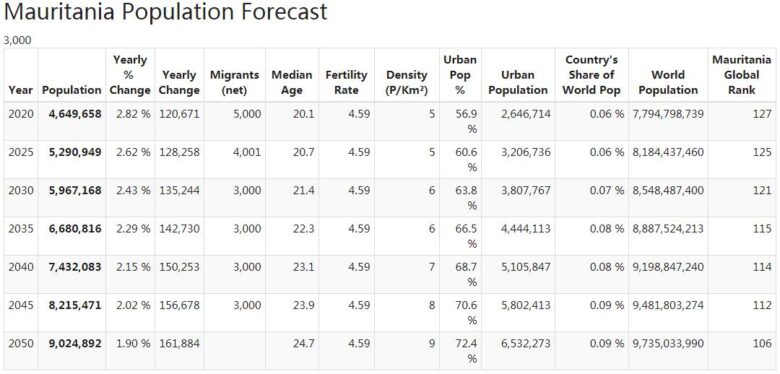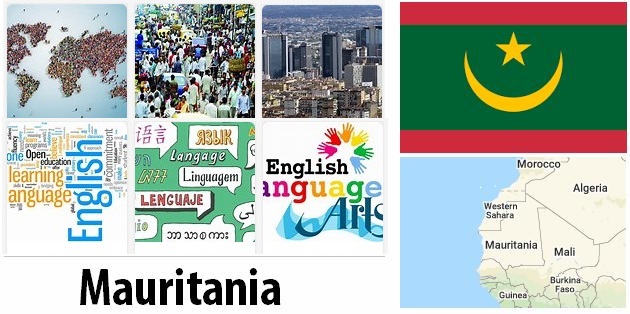Mauritania Population and Language
Around three quarters of Mauritania’s population is Moors. They are usually divided into two subgroups that have the same language and culture but different ethnic origins: beidan (white mores) and haratins (black morians). In addition, there are black African ethnic groups with no historical ties to the Moors.
Mauritania is a border zone between Arab North Africa and Black Sub-Saharan Africa. Beidan is mainly a descendant of Berber, who is a North African native, and Arab. Beidan dominates in both politics and economics. The somewhat larger group of haratins descended from slaves to the pasture. The Haratins are predominantly of black African origin.
- COUNTRYAAH.COM: Key populations estimated size and data of Mauritania, including population density of how many people per square mile. Also included are facts for population and language.
Slavery has deep roots in Mauritania. The country abolished slavery as the last country in the world in 1981 and only in 2007 did it become a criminal offense to own slaves, after pressure from the outside world. The law was tightened in 2015 when slavery was declared to be a crime against humanity. Despite this, slavery remains as part of a caste-like system where many of the victims perceive it as their given role to be slaves. According to various calculations, it is between 2 and 20 percent of the population.
In southern Mauritania, black African groups such as soninké, fulani (also called peul or halpulaar), tukulus and wolof live. These are usually farmers. Blacks have weak political influence and are often discriminated against by the Moors. After clashes between blacks and Moors in 1989, around 65,000 blacks fled to neighboring countries Senegal and Mali. The majority have returned, but in 2015 there were still about 13,000 Mauritanian refugees in Senegal. At the same time, the unrest in Mali had resulted in close to 50,000 Malian refugees in Mauritania (see Foreign Policy and Defense).
Mauritania is one of the world’s most sparsely populated countries. The Sahara desert in the north is almost uninhabited, with the exception of a few small caravan towns and the area around the iron ore extraction in Zouérate. Most Mauritanian people live in the south and to some extent along the coast to the west.
The capital Nouakchott has grown rapidly and is home to almost a quarter of the population. Traditionally, two out of three residents were nomads, but now only five percent of Mauritanian people live a nomadic life. The population is young, around 40 percent are under 15 years.
Arabic is the official language of the country and also has the status of national language, besides ugly (spoken by tukulor and fulani), soninké and wolof. The Moors speak to the Arabic dialect Hassania everyday. French is still used relatively widely.
FACTS – POPULATION AND LANGUAGE
Population
majority of mores; groups of wolof, tukulor, fulani, soninké and others
Number of residents
4,420,184 (2017)
Number of residents per square kilometer
4 (2017)
Percentage of residents in the cities
52.8 percent (2017)
Nativity / birth
34.2 per 1000 residents (2016)
Mortality / mortality
7.9 per 1000 residents (2016)
POPULATION GROWTH
2.7 percent (2017)
fertility rate
4.7 number of births per woman (2016)
Percentage of women
49.6 percent (2017)
Life expectancy
63 years (2016)
Life expectancy for women
65 years (2016)
Life expectancy for men
62 years (2016)
Language
Arabic is the official language, minority language such as ugly, soninké, wolof and others
2010
September
Attacks against Islamists in Mali
Mauritanian military attacks Aqim bases in neighboring country.
May
Death sentences for tourist murder
Three people are sentenced to death for the murder of four French tourists in 2007. However, no death penalty has been enforced for many years in the country.
April
Regional cooperation against extremist Islamists
Mauritania, together with Niger and Algeria, form a joint liaison center to counter the growing influence of Islamist group Aqim in the region.
March
Israel relations are interrupted
Diplomatic relations with Israel are broken eleven years after Mauritania as a third Arab country recognized the Jewish state.
January
Diplomatic dispute with Mali
Mauritania accuses Mali of undermining security in the region since Malian authorities released four Aqim prisoners, including one Mauritanian, in exchange for a Frenchman taken hostage. The government recalls its ambassador from Bamako.
EU aid resumes
The EU resumes aid to Mauritania, which has been withheld since the 2008 coup.




